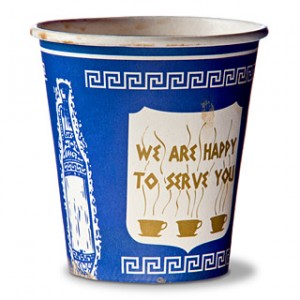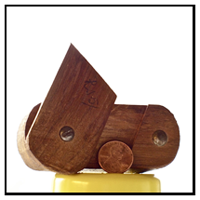Some ongoing projects concerned with the value and significance of objects:
A History of New York in 50 Objects
An artichoke and an elevator. A Checker taxicab and a conductor’s baton. A MetroCard and a mastodon tusk. Inspired by “A History of the World in 100 Objects,” the British Museum’s BBC radio series and book, the New York Times recruited historians and museum curators to identify 50 objects that could embody the narrative of New York. The Times sees their project as a people’s histor–not the history, but a history–and they invite your participation.
Show and Tell
Cabinet is pleased to be the spring 2012 home of “Show-and-Tell,” Paul Lukas’s monthly open-mic night. Previously hosted by City Reliquary, “Show-and-Tell” is exactly what it sounds like: Anyone can bring an object of personal significance and talk about it for up to three minutes. There is no theme or agenda—interesting objects and the stories behind them are their own reward.
Objects that have previously been presented at “Show-and-Tell” have ranged from the eccentric (a glass eye, an electroshock machine found in an abandoned mental hospital) to the everyday (a candy bar with an odd connection to a Chinese funeral, a pair of jeans acquired via some highly unusual haggling at an Egyptian village market). But “Show-and-Tell” is less about the objects than the histories that accompany them. Look in your own pocket or home, and you will find many excellent show-and-tell candidates. You can either (a) bring an object and be prepared to talk about it or (b) simply be part of the audience, because show-and-tell also needs people who like being shown and told. Beer for this event has been lovingly provided by Brooklyn Brewery.
The Object Ethnography Project
The Object Ethnography Project aims to show how stories influence the value, meaning and circulation of objects. It is a creative laboratory where participants–like you– determine the outcome of the cultural experiment. The team behind the Project will look at the objects and stories accumulated through the project for trends, patterns and insights about the types of objects people donate, the kinds of stories they tell about them, and how those stories influence the object’s value and subsequent exchange. The results of these studies will be presented at a conference at New York University in March 2012. An ethnography is a way of gathering knowledge about cultural phenomena that reflect the day to day meanings and systems of understanding of a particular group of people. It is a method of collecting stories and looking for trends within them. As this project moves forward, we are hoping that we gather enough objects and stories to see patterns emerge about how people relate to objects and their histories.
If you are interested in joining the group, either as a volunteer or researcher, please contact Max Liboiron at max.liboiron@nyu.edu. The project will continue until all objects have been exchanged for new stories.
Studio 360: Significant Objects
Rob Walker doesn’t see junk. He sees “objects waiting to be made significant.” Dozens of great writers contributed fictional backstories for weird and mundane objects gathered by Walker and Joshua Glenn. They’re featured in the new book Significant Objects: read some examples here. Walker and Kurt Andersen visited Vintage Thrift in Manhattan to find these three prime examples of junk. Your task is to make one piece of junk (or more) significant. Walker will judge the entries, with one winner for each object. The prize, of course, is the piece of junk itself. Click here to find out how to enter.




